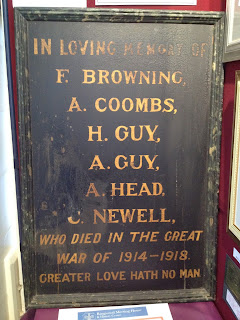Some years ago our new group of Unitarians and friends started meeting in the Meeting House in Ringwood. The Meeting House had been owned by a Unitarian congregation until the 1970s, in continuous operation as a place of worship for dissenting Protestants since 1727. We think of ourselves as their natural successors.
Like many other churches in the country, the Meeting House congregation lost some of their number in the Great War of 1914-1918, and they commemorated their loss on this board.
A few years ago, someone investigating their family tree visited Ringwood, looking for the name of a family member on the town's War Memorial; but it wasn't there. However, in dropping into the Family History archives held at the Meeting House, the name was found on the commemoration board. In this way it was revealed that there was a name missing from the War Memorial.
This weekend we remember the loss of all military personnel and civilians who have placed themselves between us and danger, that our liberty might be sustained. We remember how much we risk, when we allow our human discourse to descend into rancour and anger. And we live with a sense of gratefulness, when we are able, that life is ours to live; life that we cannot create but only nurture or let wither.
At this time of grief, grief for and remembrance of so many things, I heed this message from Stephen Lingwood, a Unitarian minister in Cardiff:
"Unitarians must recognise that the world and human nature do not reflect perfectly the image of the divine..... it is nevertheless worth saying that we live in a world where things are imperfect: that there is a problem in human experience. And it is not merely a technological problem that can be solved by technological thinking. It is not simply that the world is organised in such a way that causes suffering and pain, and if we found the right way to organise it these problems would vanish. That was the thinking of many in the past, and it could be argued that it was the thinking underlying the atrocities of the twentieth century. Technology and technocratic thinking did not lead us to become better human beings, it simply made us more efficient at killing....Rather, the problem is theological: it is a problem inherent in what it means to be human, and it is a problem that requires a theological solution, or, in other words, salvation."
If you are saddened or troubled in these times, try the poppy meditation here:
